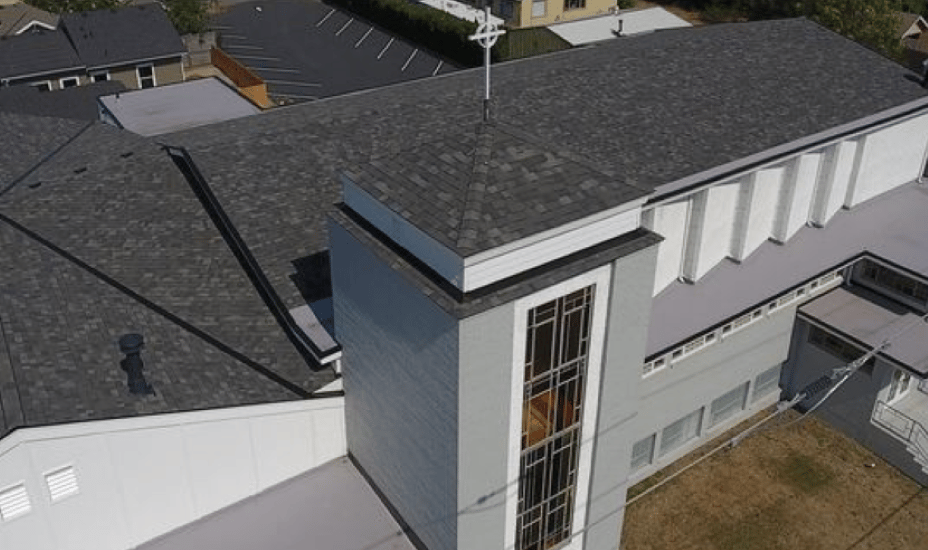
CONTRACTOR PROFILE
Three Tree Roofing
Longtime friends CJ McConaghy and Neil Haugen decided to gamble in 2017 and started their own roofing contractor firm. Six years and approximately $25 million in annual revenue later, the gamble is paying dividends.
BY BRYAN GOTTLIEB
Three Tree says this commercial project required a combination of composition low-slope shingles and TPO membrane; the old roof was leaking, damaging the wood walls. During the tear-off, rough carpenters repaired the damaged wood; principal CJ McConaghy said having journeyman carpenters on staff is a huge benefit that allows the company to maintain its tight schedules. Photo courtesy of Three Tree Roofing
SCROLL
DOWN

Like most “buddy” movies — “Stir Crazy,” “Tommy Boy,” and “The Blues Brothers” come to mind — chemistry is the through line of the duo’s success. That intangible, coupled with pedagogic knowledge of their clientele’s wont, has propelled buddies CJ McConaghy and Neil Haugen, principals of Three Tree Roofing, to pole position.
While not really “competing on the speedway,” the Kent, Wash.-based firm, with offices in Seattle and Bellevue, does let it be known — smack in the middle of its website’s homepage — the company is “Ranked the No. 1 roofer in Washington (out of 4,963 roofers statewide).” While perhaps hyperbolic, a perusal through consumer-review sites, including Yelp.com and Angi.com, lends legitimacy to the claim.
For example, Derek A., from Seattle, wrote a review on Yelp.com dated March 23, 2023, saying, in part: “I had my roof replaced last summer by Three Tree Roofing. They were on schedule, and their work seemed solid. …I’m leaving a review so far after the fact [because] I recently …put a hole in my new roof — don’t ask me how. I called Three Tree to ask about a repair, and they sent some right away to fix it [at] no charge.”
Circling back to the substantive reason Three Tree has accomplished in six years what many firms won’t achieve in a generation leads us to the deep understanding of its customers. As McConaghy acknowledged, King County, home to the Seattle metropolitan area — Washington’s densest region — is a “unique place.”
Depending on one’s vantage, Seattle is synonymous with Starbucks, 1990s “grunge” rock, rain and environmentalism. But, before assuming King County — and its 2.2 million residents — are a bunch of saturated, tree-hugging Nirvana fans sipping lattes, don’t forget Puget Sound is home to tens of thousands of ridiculously smart and industrious people. Some may enjoy a macchiato between shifts at Boeing, listening to Soundgarden while coding at Microsoft, or planting trees on Amazon’s mammoth campus.
“Our clientele here is different,” McConaghy explains. “We have a unique customer base with very specific Google-[assisted] ideas, and they've gone down some pretty deep rabbit holes about ‘smog reducing granules,’ or a product called Euroshield that uses recycled tires; … people come [to us] with this info, and I promise you, no one else in the country cares.”
But the customers calling on Three Tree Roofing do care, which means the company’s principals and their 90 employees care, too. And, to the extent its clientele is informed, exacting and carbon-conscious, the company has pegged the objective of making customers feel informed, prioritized and satisfied — all while being charged a fair price — its lodestar.
“Fair” is italicized since McConaghy readily acknowledges Three Tree isn’t the least expensive roofer available; a race to the bottom is rarely in the contractor’s best interest. Nor is it the most costly contractor around. Fair pricing for quality craftsmanship, topped by well-calibrated customer service, is undoubtedly entitled to be a premium without being cost-prohibitive.
“I think it really just comes down to choosing to do it differently,” McConaghy says, noting that Three Tree’s competitors — “the good companies, the medium companies, and the bad companies” — are all pulling leads from the same sources. With 70% of the company’s revenue derived from residential roofing, the majority of which is reroofing versus new construction, headwinds can be stiff.
“That doesn't mean that we're the cheapest; we're using ‘middles numbers,” McConaghy says.
“That's usually who you go with, so we try really hard to be there.”
The company's principals insist that Three Tree’s core values translate into not selling to homeowners but educating them so that they may make the best decision for their needs.
“What wins us over for customers is the overall experience: from the phone call placed and someone actually gets a live person who has the answers … then you meet our estimators — who are estimators, not salesmen, selling you; it's not a ‘same-day’ close,” McConaghy explains.

Three Tree was awarded a contract to reroof the historic Chelsea Apartments in Redman, Wash., originally built in 1906. They had gone through several reroofings over a century; the company said it was both challenging and rewarding. Trials included limited access, multiple existing roofing layers, necessary carpentry repairs, and much custom stucco work. The reward: according to the company, the roofing turned out great; most residents didn’t even know they were there. The time frame from start to finish: 14 days. Photo courtesy of Three Tree Roofing
Sunlight in Elon’s New Frontier
As McConaghy touched upon, the marketplace in Washington state is sensitive to environmental considerations, meaning that being green is more than living in the “Emerald State.” To that end, Three Tree is quite bullish on solar-integrated roofing products and has already established some impressive bona fides in the nascent space.
At the start of 2021, Three Tree was preparing to share some big news. Months earlier, a call came into the office initially fielded by one of the company’s estimators before passing it off to the bosses.
“So we were just doing our thing, and the phone rang, and [the estimator asked], ‘Who are you, Tesla? What? Elon…,’ and that’s how it literally started,” McConaghy recalls. “They said they had done a background check on the company: ‘We checked your Dun and Bradstreet score, and also on both you and CJ, and we really like what you guys stand for.’”
Telsa sought out Three Tree to install the first Tesla Solar Roof in Washington state. The partners recognized the opportunity as potentially significant but didn’t go into it blithely.
“We thought, all right, let's look into it; let's see if we even want to be a part of [them],” McConaghy says, describing countless back-and-forth Zoom meetings.
Ultimately, Tesla wanted to supply its material to the firm, essentially becoming the electrical product manufacturer-supplier version of Three Tree’s go-to, SRS-owned distributor — no strings attached.
“We wanted to make sure that we actually trusted it — we're on the hook for it,” McConaghy adds. “[It’s] something that we wanted to make sure could be set up and sustainable.”
When McConaghy says they “looked into it,” they did more than just visit a factory or run their hands over Tesla Roof’s photovoltaic cell-embedded glass tiles. In partnership with Tesla’s chosen electrical contractor, the companies did something that sounded unique to hear but made perfect sense given the product’s newness: they “practiced” learning how to install a Tesla Solar Roof, which is not an inexpensive tutorial.
Three Tree set out and built various roof components in its warehouse to practice on, like a portion of a 4/12-pitched shed roof and an expanse with skylights to work around. After his crew earned its certification from Telsa, the firm found its first customer to receive the cutting-edge roofing system.
“The very first customer that signs up is this steep [sloped] roof,” McConaghy says with ironic humor. “So our first job, we don't get to experiment on an easy rambler; we're on this steep roof, and Tesla doesn't even know how to do it.”
Undeterred, the crew plowed ahead and, by all accounts, things went well.
“It turned out awesome. Everything went smooth,” McConaghy adds. “It was a great job. [Tesla] was happy; they learned a lot and have now been able to offer it to [more people] because they have [steep-slope] experience.”
While the company has since installed several more Telsa Solar Roof systems, McConaghy will be the first to say how expensive it can be. While not identical, there are more affordable products that have recently come to market that the company plans to leverage as solar roofing systems increase in market share.
“Solar is definitely the future of roofing, and if you're not on board with it now, you're missing out,” McConaghy says. “The [photovoltaic] shingles that CertainTeed offers, which is similar to GAF’s, is called the Solstice shingle,” which integrates with existing composite shingles already in use, “and we all know [composite] is the most economical choice for roofing: It's affordable, it's sustainable, and then if you want to add solar to that roof, and you can get it provided from the same manufacturer, so it's all under one warranty. That's the future.”

José Jeremías Rodríguez, one of Three Tree Roofing’s crew chiefs, with his roofing crew — here as teammates — play in an amateur soccer league, and the company is the team’s sponsor. Photo courtesy of Three Tree Roofing
From RadioShack to Tesla
Haugen and McConaghy met and became friends in their teens. The first test of their compatibility working together came at age 15 through jobs at RadioShack while in high school. McConaghy still waxes when describing what made him love that job and what he took from it that he sees in his current role.
“We met there and became best friends, but also just really had a lot of fun interacting with people and not necessarily selling them things, but just connecting dots,” he says. “Figuring out the problem with whatever they came in for and then solving it, so that kind of sparked something deep inside that we didn't really know we'd be able to use again until we started Three Tree Roofing.”
After high school, the pair went to cut their teeth in the rough and tumble world of roofing. These were no cush office jobs: steep slopes, a hot sun blazing down onto black-felted plywood. The two learned their trade’s best practices to understand roof system operation, from laying membrane to installing gutters and downspouts.
Getting paychecks and a sun tan seemed like great perks, but these friends wanted more. As important, those best practices they absorbed while off terra firma were complemented by what they experienced — or didn’t — as employees. They encountered what they believed were the downsides prevalent within the roofing industry, notably poor treatment of roofers and underwhelming customer service.
“Okay, this isn't too bad, I have to take a bath with gasoline to get tar off of me, but that's okay,” McConaghy says, laughing. “And then that kind of morphed into learning more about how a company works — [all the while] missing that RadioShack thing where we got to talk to people and connect dots — and then we moved into sales positions; and then eventually decided, hey, this would be something really fun to do for us.”
By then, the friends had each gotten married and started families. McConaghy and his wife, Niesha, have two boys, ages 17 and 11. Haugen and his wife, Alicia, have a son, age 16. Three boys. Three Tree Roofing.
You see where this is headed.
One day, six or so years earlier, McConaghy came home from work, and something moved within him.
“I came home from work, he'd come home from work, and I was like, ‘Man, I'm kind of doing everything here,’ [and Neil said] ‘It's like I'm kind of doing everything here too, so why are we doing that for somebody else?’”
Over dinner, maybe that same night, or perhaps a week later, McConaghy’s memory has since become the company’s origin story, so particulars are secondary.
“Let's do it a different way, and it became part of our conversations at dinner,” McConaghy says. “We're like, man, let's just get this going. Let's call it a day and just go for it … you have to just believe. And we did. We knew we could do it; our wives were very supportive of it. It was just time to get the party started.”
Brian Gottleib is managing editor of Roofing Contractor. Reach him at 248-786-1591 or gottleibb@bnpmedia.com.
